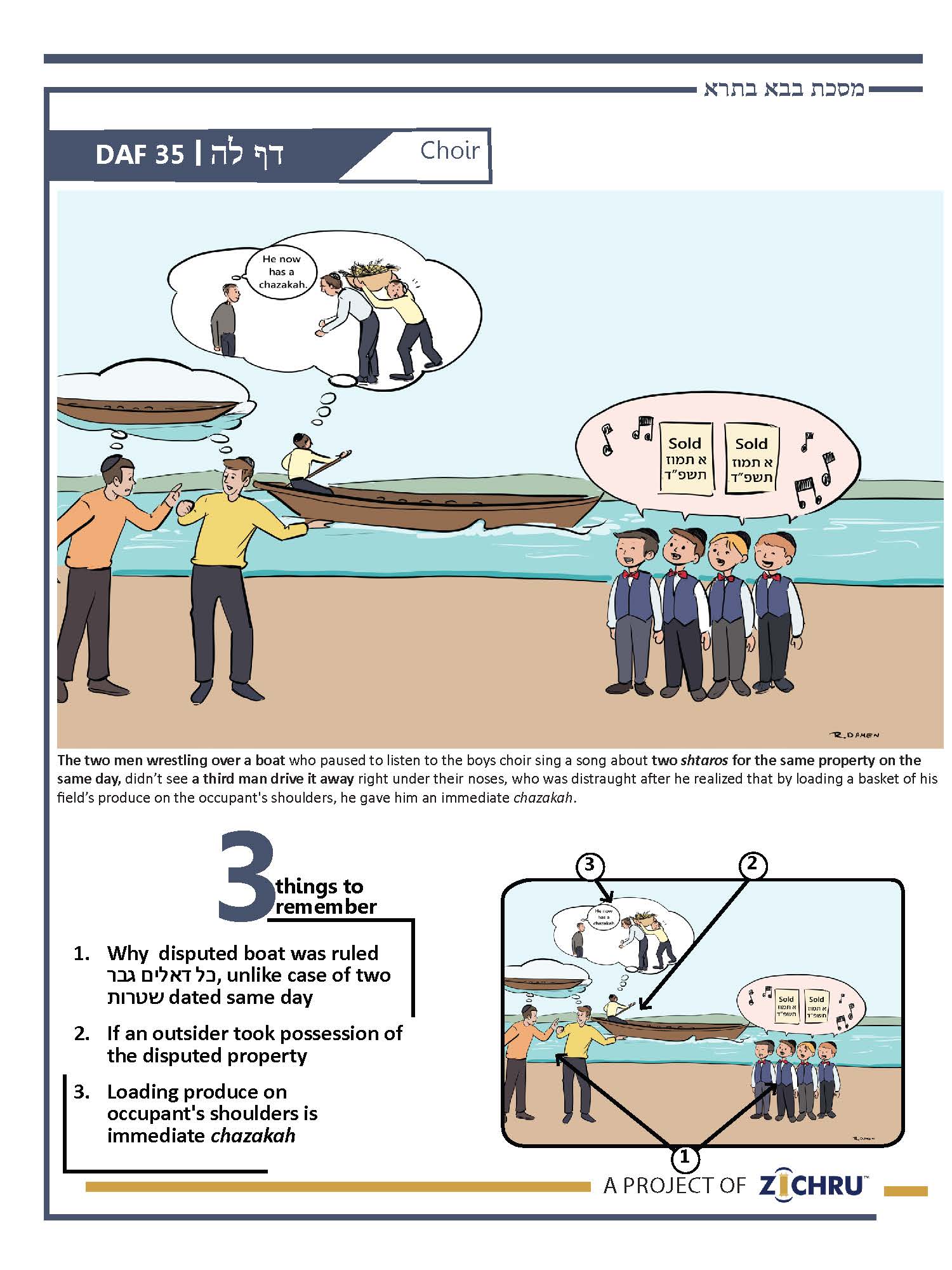Bava Basra - Daf 35
- Audio Timestamps
0:00 - The 3 Sugyos
2:43 - Review of 3 Sugyos
5:19 - Siman
7:48 - 4 Blatt Back Chazarah
16:23 - Pop Quiz (Last 7 blatt)
For access to all Zichru resources including PDFs, and illustrations CLICK HERE
- Why the disputed boat was ruled כל דאלים גבר, unlike other cases
Regarding a boat of disputed ownership, Rav Nachman ruled כל דאלים גבר – whoever is stronger wins. The Gemara asks why this case is different from שני שטרות היוצאין ביום אחד – two documents which appear in Beis Din, each gifting the same property to a different person, and dated the same day. Regardless of when the document was given on that day, the gift takes effect at the end of the day, so the שטרות are in conflict. There, Rav says: יחלוקו – they divide the property, and Shmuel says: שודא דדייני – it is up to the judge’s discretion!? The Gemara answers that there, ליכא למיקם עלה דמילתא – the truth of the matter cannot be resolved, since the dates are identical, whereas here, we may later discover the boat’s true owner. The Gemara asks why this case is different from המחליף פרה בחמור – one who exchanges a cow for a donkey, and the cow gave birth, and they argue if the birth was before or after the exchange, about which a Mishnah rules that the calf is divided!? The Gemara answers that there, להאי אית ליה דררא דממונא – this [party] has a legitimate claim to the calf, as does the other (since they each owned the mother), whereas here, the fraudulent party has no basis for his claim.
- If an outsider took possession of the disputed property
Regarding disputed property, where Rav Nachman ruled כל דאלים גבר, the Nehardeans say: אם בא אחד מן השוק והחזיק בה – if someone came from the market (i.e., an outsider) and took possession of it, אין מוציאין אותה מידו – we do not remove it from him. Although he does not claim to own it, neither of the two litigants can take it from him, since it is possible that neither of them owns it. This is based on Rebbe Chiya’s Baraisa: גזלן של רבים לאו שמיה גזלן – one who steals from the public is not considered a robber. The Nehardeans interpret the Baraisa as referring to this case (the “public” being the two disputants) and ruling that the item is not taken from the outsider who steals it. Rav Ashi says the outsider is considered a robber and cannot keep the item. Rather, the Baraisa’s expression “he is not a robber” means: שלא ניתן להשבון – that [the robbery] cannot be returned to its owner. The robber cannot atone for his sin by returning it, since he does not know that the true owner will retrieve it. Since he stole it, he is responsible to ensure it is returned to its true owner.
- דלי ליה איהו גופיה צנא דפירי
Rebbe Abba says: אי דלי ליה איהו גופיה צנא דפירי – if [the former owner] himself loaded a basket of the field’s produce onto [the מחזיק’s] shoulders, לאלתר הוי חזקה – it is a chazakah immediately, without three years of consumption. If the land still belonged to the former owner, he never would have assisted the מחזיק in carrying away the produce. Rav Zevid said, however, that if the מערער claims "לפירות הורדתיו" – I installed [the מחזיק] to receive produce from the field as a sharecropper, and this basket was his share, he is believed. Still, if the מחזיק consumed the produce for three years, the former owner cannot claim the produce was taken as a sharecropper. Rav Ashi asked Rav Kahana what the owner should have done if the sharecropper was indeed installed for three years (and entitled to its produce), and he answered: איבעי ליה למחויי – he should have protested, i.e., declared before witnesses that the מחזיק takes produce only as a sharecropper.
Siman – Children’s Choir Singing La-La-La
The two men fighting over a boat who paused to listen to the boys' choir sing a song about shtaros on the same day, didn’t see a third man drive it away right under their noses, who was distraught after he realized that by loading a basket of his field’s produce on the occupant’s shoulders, he gave him an immediate chazakah.


